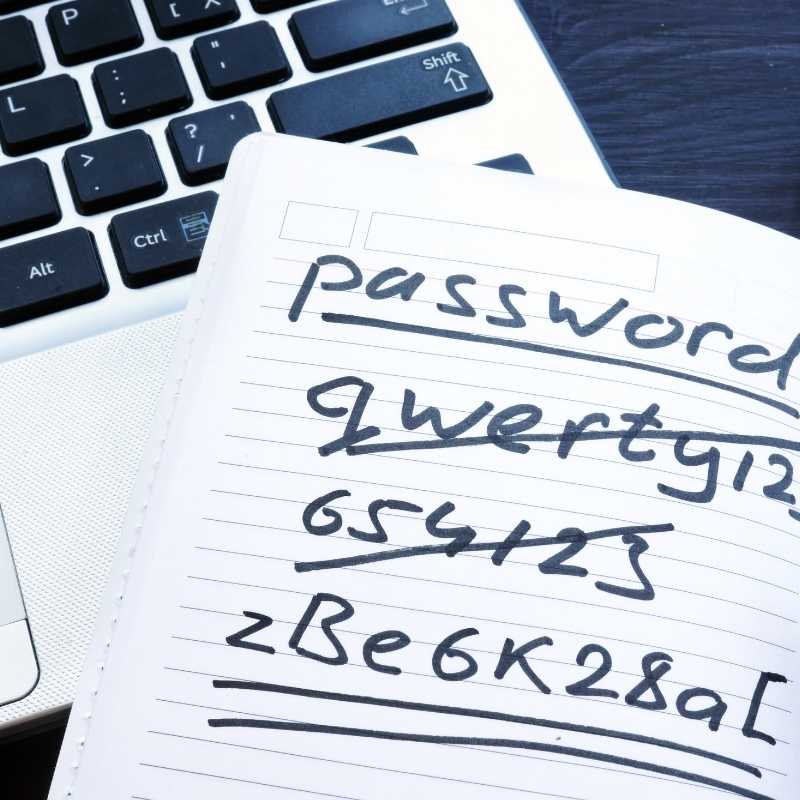While it might not seem like there is much the average person can do to stop ID theft from happening, there are steps individuals can take to minimize personal risk. One of the most practical ones? Ditch the jot-it-down-on-a-notepad method of password tracking in favor of a secure software application that generates and stores passwords on your behalf. In other words, get yourself a password manager, stat.
Internet security is on everyone’s mind these days, and with good reason. In the first half of 2018 alone there were 668 known data breaches with more than 22 million records exposed, according to a report published by the Identity Theft Resource Center, a non-profit organization that supports victims of identity theft. This doesn't even take into account the massive Marriott data breach announced in December 2018!
While a password manager is no guarantee that you won’t fall victim to hacking or a data breach, it will improve your security situation exponentially. Need more convincing? Here are six benefits to using a password manager:
- You’ll have one master password to remember. That is it. Just one. You’ll use this password to securely log-in to your password management system, otherwise known as your “vault.” From there you can access all of your other passwords. No sticky notes, no lists of passwords saved on your hard drive, no crossed fingers. The “forgot my password” field on your log-on pages will become a thing of the past because you won’t be expected to remember any of them.
- All of your passwords will be complex, encrypted passwords. Because the software generates passwords on your behalf, you will not have to sit down and create passwords on your own. You won’t have to wonder if the password is tough enough, and you won’t have to think about whether you used the right combination of characters. And there is absolutely zero risk that these passwords will be based on personal information, like your birthday or your dog’s name. Unlike the average password, these passwords are not easily hackable. They are very long, very random and very complex. They also tend to use combinations of numbers, letters and characters that only a computer could come up with (you can indicate if a password has specific requirements, like a certain number of letters, numbers and characters).
- Changing and adding passwords is super easy. In the event that a password needs to be changed, guess what? You don’t have to do much of anything! Simply log-in to your vault and tell the software which password(s) to change, save said changes, and you’re done. What’s more, the system itself is keeping track of security breaches. So, if any of your passwords have been compromised (or even just potentially compromised) you will be notified and instructed to change them. This provides peace of mind because in the event that you miss an announcement about a data breach or hacking event, you’ll know the password manager’s got your back. Need to add a new password? Just as easy! As long as you are logged in, as soon as you start to create a new account on a website that requires a password, your password management system will know to ask if it should generate and save one for you.
- You can access your passwords on all your devices. As long as you know your master password and download the necessary apps, your passwords are available to you on your smartphone, your computer, and your tablet. On vacation and need to log into Online Access HD, check on medical test results, or binge watch your favorite show on Netflix? No problem. The passwords you need are at your fingertips, even if all you have with you is your smartphone. Furthermore, if you add a new password on one device it will be accessible on all the others.
- The financial investment is minimal. And in some cases, it's $0. Many of the most popular password management systems, such as Dashlane, offer basic plans for free. If you want to pay for additional safety features (which is recommended), it might set you back a few bucks. Dashlane and 1Password, for example, offer premium plans for $4.99 per month, billed annually; LastPass charges $3 per month ($36/annually). Not sure which one to try? Simply type “password manager” into your favorite search engine for lists of and reviews on all of the options.
- Once you get it set up, it is easy to maintain. OK, so there is an upfront time investment in implementing the use of a password manager. You have to decide which one to use, read the instructions, download the app, gather up your accounts and passwords, enter the data, and memorize your new master password. And all of this could require an afternoon of your full attention. But once all these tasks are done, you can sit back, relax, and stop stressing about passwords. The time spent will be well worth it!
“All of the high-quality password vault products on the market support the use of multi-factor authentication solutions like Google Authenticator for increased security of vault access," said David Minker, Hanscom FCU's Chief Information Officer. "Of course, choosing a secure master passphrase and maintaining its secrecy is of the utmost importance, so I’d strongly recommend our members enable their vault’s multi-factor option as soon as they begin using the product as well – that way, if their vault master passphrase is somehow compromised, without the second factor of authentication, even the master passphrase itself is of little use and wouldn’t, by itself, allow access to the Vault.”
Dawn Weinberger is a freelance writer in Portland, OR.
Others are reading:




-2.png)
-1.png)








Comment